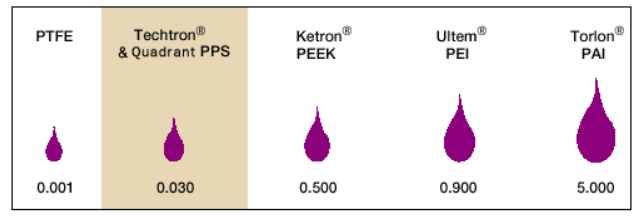Knowde Enhanced TDS
Identification & Functionality
- Additives Included
- Chemical Family
- Fillers Included
- Polymer Name
- Technologies
- Product Families
Features & Benefits
- Materials Features
- Product Overview
- Excellent chemical resistance
- Essentially zero moisture absorption
- Machines to tight tolerances
- Excellent alternative to PEEK at lower temperatures
Techtron® PPS (polyphenylene sulfide) products offer the broadest resistance to chemicals of any advanced engineering plastic. They have no known solvents below 392°F (200°C) and offer inertness to steam, strong bases, fuels and acids. Minimal moisture absorption (see Figure 21) and a very low coefficient of linear thermal expansion, combined with Mitsubishi Chemical Advanced Materials's proprietary stress relieving processes, make these PPS products ideally suited for precise tolerance machined components. In addition, Techtron® PPS products exhibit excellent electrical characteristics and are inherently flame retardant.
Applications & Uses
- Markets
- Plastics & Elastomers End Uses
Properties
- Color
- Flame Rating
- Mechanical Properties
- Thermal Properties
- Electrical Properties
- Miscellaneous Properties
| Value | Units | Test Method / Conditions | |
| Tensile Strength | 5000 | psi | ASTM D638 (8) |
| Tensile Strain (Elongation) at Break | 1 | % | ASTM D638 (8) |
| Tensile Modulus of Elasticity | 920 | ksi | ASTM D638 (8) |
| Compressive Strength | 15000 | psi | ASTM D695 (11) |
| Izod Impact (Notched) | 1 | ft.lb/in | ASTM D256 |
| Flexural Strength | 10000 | psi | ASTM D790 (13) |
| Flexural Modulus of Elasticity | 820 | ksi | ASTM D790 |
| Hardness (14) | 93 | Rockwell M | ASTM D785 |
| Hardness (14) | 126 | Rockwell R | ASTM D2240 |
| Value | Units | Test Method / Conditions | |
| Melting Temperature (DSC, 10°C (50°F) / min) | 540 | °F | ASTM D3418 |
| Thermal Conductivity (73°F) | 1.77 | BTU in./(hr. ft² ˚F) | — |
| Coefficient of Linear Thermal Expansion (-40 to 300°F) | 17 | µin./in./°F | ASTM E-831 (TMA) |
| Heat Deflection Temperature (Method A: 1.8 MPa (264 PSI)) | 490 | °F | ASTM D648 |
| Continuous Allowable Service Temperature in Air (20.000 hrs) (3) | 450 | °F | — |
| Flammability (3 mm) (5) | V-0 | — | UL 94 |
| Value | Units | Test Method / Conditions | |
| Surface Resistivity | 100000 | Ohm/sq. | ANSI/ESD STM 11.11 |
| Value | Units | Test Method / Conditions | |
| Specific Gravity | 1.52 | — | ASTM D792 |
| Water Absorption (After 24h Immersion in Water of 73°F) | 0.02 | % | ASTM D570 (17) |
| Water Absorption (At Saturation in Water of 73°F) | 0.03 | % | ASTM D570 (17) |
| Wear Rate | 800 | in³.min/ft.lbs.hr x 10⁻¹⁰ | QTM 55010 (19) |
| Dynamic Coefficient of Friction | 0.2 | — | QTM 55007 (20) |
| Limiting PV (100 FPM) | 25000 | ft.lbs/in².min | QTM 55007 (21) |
Regulatory & Compliance
- Certifications & Compliance
Technical Details & Test Data
- Moisture Absorption at Saturation (%)

- Engineering Notes
All Mitsubishi Chemical Advanced Materials-EPP's PPS products offer dimensional stability and strength at moderate temperatures. They are rated for continuous service to 425°F (220°C), but strength and stiffness vary based on temperature and grade. Unreinforced Techtron® PPS is generally not recommended for wear applications. Products like Torlon® PAI or Ketron® PEEK are better selections for high temperature wear applications. When designing with compression molded grades, it is important to note its relatively low elongation and impact strength.
- Note
- Thermal Properties - The figures given for these properties are for the most part derived from raw material supplier data and other publications.
- (2) Values for this property are only given here for amorphous materials and for materials that do not show a melting temperature (PBI, PAI & PI). DMA settings, oscillation
- the amplitude of 0.20 mm; a frequency of 1 Hz; heating rate of 2°C/min
- (3) Temperature resistance over a period of min. 20,000 hours. After this period of time, there is a decrease in tensile strength – measured at 23 °C – of about 50 % as compared with the original value. The temperature value given here is thus based on the thermal-oxidative degradation which takes place and causes a reduction in properties. Note, however, that the maximum allowable service temperature depends in many cases essentially on the duration and the magnitude of the mechanical stresses to which the material is subjected.
- (4) Impact strength decreasing with decreasing temperature, the minimum allowable service temperature is practically mainly determined by the extent to which the material is subjected to impact. The value given here is based on unfavorable impact conditions and may consequently not be considered as being the absolute practical limit.
- (5) These estimated ratings, derived from raw material supplier data and other publications, are not intended to reflect hazards presented by the material under actual fire conditions. There is no ‘UL File Number’ available for these stock shapes.
- Mechanical Properties - Most of the figures given for the mechanical properties are average values of tests run on dry test specimens machined out of rods 40-60 mm when available, else out of plate 10-20mm. All tests are done at room temperature (23° / 73°F)
- (7) Test speed: either 5 mm/min or 50 mm/min [chosen acc. to ISO 10350-1 as a function of the ductile behavior of the material (tough or brittle)] using type 1B tensile bars
- (8) Test speed: either 0.2"/min or 2"/min or [chosen as a function of the ductile behavior of the material (brittle or tough)] using Type 1 tensile bars
- (9) Test speed: 1 mm/min, using type 1B tensile bars
- (10) Test specimens: cylinders Ø 8 mm x 16 mm, test speed 1 mm/min
- (11) Test specimens: cylinders Ø 0.5" x 1", or square 0.5" x 1", test speed 0.05"/min
- (12) Test specimens: bars 4 mm (thickness) x 10 mm x 80 mm; test speed: 2 mm/min; span: 64 mm.
- (13) Test specimens: bars 0.25" (thickness) x 0.5" x 5"; test speed: 0.11"/min; span: 4"
- (14) Measured on 10 mm, 0.4" thick test specimens.
- (15) Electrode configuration: Ø 25 / Ø 75 mm coaxial cylinders; in transformer oil according to IEC 60296 ; 1 mm thick test specimens.
- (16) Measured on disks Ø 50 mm x 3 mm.
- (17) Measured on 1/8" thick x 2" diameter or square
- (18) Test procedure similar to Test Method A: “Pin-on-disk” as described in ISO 7148-2, Load 3MPa, sliding velocity= 0,33 m/s, mating plate steel Ra= 0.7-0.9 μm, tested at 23°C, 50%RH.
- (19) Test using journal bearing system, 200 hrs, 118 ft/min, 42 PSI, steel shaft roughness 16±2 RMS micro inches with Hardness Brinell of 180-200
- (20) Test using Plastic Thrust Washer rotating against steel, 20 ft/min and 250 PSI, Stationary steel washer roughness 16±2 RMS micro inches with Rockwell C 20-24
- (21) Test using Plastic Thrust Washer rotating against steel, Step by step increase pressure, Test ends when plastic begins to deform or if temperature increases to 300°F.

